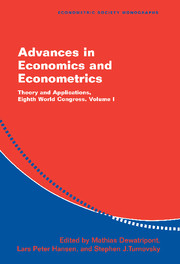Book contents
- Frontmatter
- Contents
- List of Contributors
- Preface
- 1 Auctions and Efficiency
- 2 Why Every Economist Should Learn Some Auction Theory
- 3 Global Games: Theory and Applications
- 4 Testing Contract Theory: A Survey of Some Recent Work
- 5 The Economics of Multidimensional Screening
- A Discussion of the Papers by Pierre-Andre Chiappori and Bernard Salanié and by Jean Charles Rochet and Lars A. Stole
- 6 Theories of Fairness and Reciprocity: Evidence and Economic Applications
- 7 Hyberbolic Discounting and Consumption
- A Discussion of the Papers by Ernest Fehr and Klaus M. Schmidt and by Christopher Harris and David Laibson
- 8 Agglomeration and Market Interaction
- 9 Nonmarket Interactions
- Index
4 - Testing Contract Theory: A Survey of Some Recent Work
Published online by Cambridge University Press: 19 January 2010
- Frontmatter
- Contents
- List of Contributors
- Preface
- 1 Auctions and Efficiency
- 2 Why Every Economist Should Learn Some Auction Theory
- 3 Global Games: Theory and Applications
- 4 Testing Contract Theory: A Survey of Some Recent Work
- 5 The Economics of Multidimensional Screening
- A Discussion of the Papers by Pierre-Andre Chiappori and Bernard Salanié and by Jean Charles Rochet and Lars A. Stole
- 6 Theories of Fairness and Reciprocity: Evidence and Economic Applications
- 7 Hyberbolic Discounting and Consumption
- A Discussion of the Papers by Ernest Fehr and Klaus M. Schmidt and by Christopher Harris and David Laibson
- 8 Agglomeration and Market Interaction
- 9 Nonmarket Interactions
- Index
Summary
INTRODUCTION
It is a capital mistake to theorise before one has data.
Arthur Conan Doyle, A Scandal in Bohemia.Since the early seventies, the development of the theoretical literature on contracts has been nothing short of explosive. The study of more and more sophisticated abstract models has gone hand in hand with the use of the tools of the theory to better understand many fields of economics, such as industrial organization, labor economics, taxation, insurance markets, or the economics of banking. However, it is only fair to say that the empirical validation of the theory has long lagged behind the theoretical work. Many papers consist of theoretical analyses only, with little attention to the facts. Others state so-called stylized facts often based on fragile anecdotal evidence and go on to study a model from which these stylized facts can be derived. Until the beginning of the eighties, empirical tests using actual data and econometric methods were very rare, even though the theoretical literature had by then given birth to a large number of interesting testable predictions.
Although such a long lag is not untypical in economics, it is clearly unfortunate, especially when one compares our practice to that of other scientists. Even without fully sharing the somewhat extreme methodological views expressed above by Sherlock Holmes, one can hardly dispute that interactions between theory and reality are at the core of any scientific approach. To give only one example, the models of insurance markets under asymmetric information developed at the beginning of the seventies were extensively tested (and found to lack empirical support) only in the middle of the nineties.
- Type
- Chapter
- Information
- Advances in Economics and EconometricsTheory and Applications, Eighth World Congress, pp. 115 - 149Publisher: Cambridge University PressPrint publication year: 2003
- 101
- Cited by

